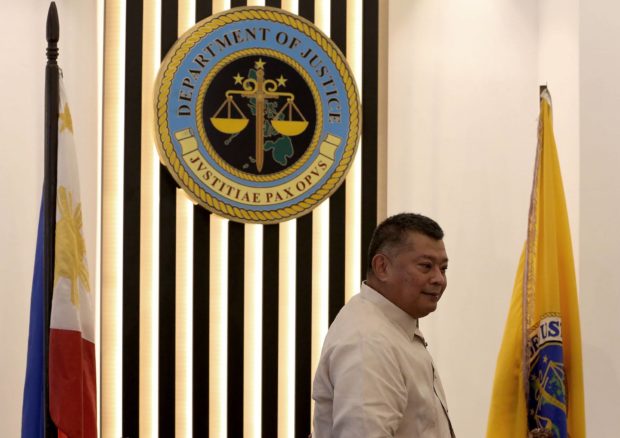DOJ orders gov’t prosecutors: Withdraw weak cases
Justice Secretary Jesus Crispin ‘Boying’ Remulla during a press conference at the DOJ office in Manila on Oct. 18, 2022,. (File photo by RICHARD A. REYES / Philippine Daily Inquirer)
MANILA, Philippines — The Department of Justice (DOJ) has issued guidelines for the withdrawal of cases that have been deemed to have no “reasonable certainty of (resulting in a) conviction” before first-level courts.
First-level courts refer to municipal trial courts (MTCs), municipal trial courts in cities (MTCCs), and metropolitan trial courts (MeTCs).
“I … directed our prosecutors to carefully assess their cases with the first level courts… to determine the existence of a reasonable certainty of conviction based on the evidence at hand, the availability of witnesses, and the like. Otherwise, they are to cause or move for their dismissal,” Remulla said on Tuesday.
Remulla mentioned his directive on the sidelines of the 52nd Session of the United Nations Human Rights Council (UNHRC) in Geneva, Switzerland, where he enumerated the measures being taken by the Marcos administration to improve the administration of justice in the country.
“Only strong cases will be filed in court,’’ the DOJ chief said in a separate statement in Filipino and released in Manila. “It’s the poor who are victimized in cases that are weak but still filed just to harass them. We need to raise the quality of the evidence presented at the prosecutor’s level so that no one will be jailed just like that.’’
‘No movement’
Under the guidelines, the DOJ said, there is reasonable certainty of conviction “when a prima facie case exists based on (1) the evidence-at-hand including but not limited to witnesses, documentary evidence, real evidence, and the like, and (2) such evidence, on its own and if left uncontroverted by accused, shall be sufficient to establish all the elements of the crime or offense charged, and consequently warrant a conviction beyond reasonable doubt.”
But the guidelines will not apply to pending cases that are “intimately related or closely corresponding to cases still pending before the Regional Trial Courts (RTCs) and Appellate Courts.”
Under Section 3 of the guidelines, government prosecutors are also directed to move for the withdrawal of the cases which have “no considerable movement over a period of three months or more”; if the complainant or his or her witnesses have repeatedly failed to appear in court without valid reason despite due notice; or if the material pieces of evidence are not available or can no longer be produced.
Nonappearance
“The trial prosecutor shall immediately review all cases under him, identify those cases covered by Section 3, prepare an inventory of said cases, and ascertain the specific reason/s why the said cases have been left idle in the court dockets,” it added.
Under Section 4, a trial prosecutor “is mandated to: (a) exert efforts to communicate with complainant and/or his witnesses and inform them of the possible dismissal of the case due to their nonappearance; (b) ascertain from complainant whether or not he/she is still interested to pursue the case; (c) direct complainant to submit the pertinent evidence needed at the next scheduled hearing to avoid further delay of trial, (or the case shall be recommended for dismissal); and (d) for cases falling under the Rules of Summary Procedure, examine the evidence and determine whether the evidence on hand is sufficient to meet the threshold of reasonable certainty of conviction.”
The prosecutor is also required “to make a report, prepare an inventory of said cases, and submit the same to the city/provincial prosecutor, with his/her recommendation to move for the withdrawal of the information and/or dismissal of the case/s.”
‘Paradigm shift’
“Upon filing of the motion to withdraw information by the city/provincial prosecutor, the complainant is not precluded from filing his/her comment/opposition thereto, in order to provide him/her a final opportunity to justify why the information should not be withdrawn,” the guidelines added.
In his speech before the UNHRC on Tuesday, Remulla said the “threshold for indictment will be increased from probable cause to prima facie, or (one) that satisfies a reasonable certainty of conviction.”
Part of case buildup
“It is a paradigm shift,’’ he said. “(T)he new rule will also ensure that there will not be any frivolous cases or harassment suits against our innocent citizens. No longer shall our penal code be used, abused or weaponized.”
According to Remulla, the low threshold of mere “probable cause” as a requirement for indicting persons in court had led to a large number of indictments.
“Since the quantum of proof for the conviction after trial is proof beyond reasonable doubt, the wide gap between these two standards account for our low conviction rate,” he said, adding:
“Worse, our prosecutors are also not involved in the buildup of cases before filing in court. For the longest time, only the law enforcement agencies handle on their own the building up of cases, collection and preservation of evidence. This led to the filing of weak cases that were eventually dismissed by the courts.”
With the new policy, Remulla said, government prosecutors would now “proactively participate in, cooperate and coordinate” with law enforcers in case buildup.















